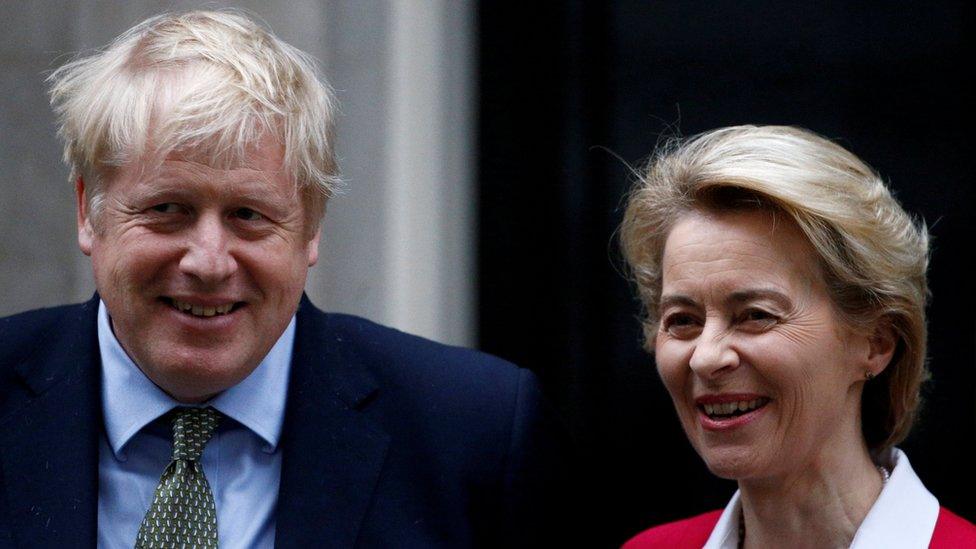Brexit: Trade deal with UK 'up to EU', says Boris Johnson
- Published
- comments
Boris Johnson: 'It’s just up to them'
Boris Johnson has said it is now up to the EU to avoid a no-deal scenario over post-Brexit trade.
After the final round of formal talks between officials, the prime minister said a deal was "all there".
But the prime minister said Brussels had to be "commonsensical" to get it across the line, with both sides setting an October deadline to settle their differences.
EU Commission President Ursula von der Leyen called for talks to "intensify".
She is due to meet Mr Johnson on Saturday via video call to "take stock" of the situation and decide the next steps.
Talks between chief negotiators Lord David Frost and Michel Barnier broke up earlier, without an agreement.
Mr Barnier said "persistent serious divergences" remained between the two sides, while Lord Frost said there was "very little time now to resolve these issues".
The UK formally left the EU in January, but entered a transition period - where the UK has kept to EU trading rules and remained inside its customs union and single market - to allow the two sides to negotiate a trade deal.
Formal talks began in March and continued throughout the pandemic, but there has been concerns over whether a plan would be agreed before that period runs out on 31 December.
Issues that have become particular sticking points between negotiators are state aid - where governments give financial support to businesses - and fishing rules.
The EU has said a deal must be reached before the end of October to allow it to be signed off by the member states before the end of the year, while Mr Johnson has said both sides should "move on" if agreement was not reached by the middle of the month.
If a deal is not done, the UK will go on to trade with the bloc on World Trade Organisation rules.
'Every chance'
In a round of interviews with the BBC, Mr Johnson said: "I hope that we get a deal, it's up to our friends."
He told BBC Northern Ireland's Mark Devenport: "They've done a deal with Canada of a kind that we want, why shouldn't they do it with us?
"We're so near, we've been members for 45 years. It's all there, it's just up to them."
The PM also said to BBC Midlands Today's Elizabeth Glinka there was "every chance to get a deal", but added: "It's up to our friends and partners to be commonsensical."

Boris Johnson and Ursula von der Leyen will speak via video conference on Saturday
Speaking ahead of her call with the UK prime minister, Mrs von der Leyen said: "We should not forget we have made progress in many many different fields, but of course the most difficult ones are still completely open."
She pointed to the problems with the so-called "level playing field" with state aid - calling it "a question of fairness" - as well as the issue of fishing,
But, she added: "Overall, where there is a will there is a way, so I think we should intensify the negotiations because it is worth working hard on it."


News of the talks between Boris Johnson and Ursula von der Leyen is significant and Saturday cannot be dismissed as more blah blah in the Brexit process.
Speculation is rife, of course, as to why the prime minister and the EU Commission president have suddenly scheduled their digital tête-à-tête.
In general, it's interpreted as a positive sign.
The accepted wisdom has always been that negotiating teams can only make so much progress.
And that the final push - the politically tough decisions on how much to compromise on the final sticking points - would have to come from up high.
But we're not there yet.
It's possible the prime minister and Mrs von der Leyen are talking tomorrow to explore who is really willing to make what compromises on the final outstanding issues.
For now, the why's and what's of Saturday's talks are pure speculation.
The only thing we know for sure: the UK and EU say they want a deal - though not at any price.
Yet if and when a deal eventually emerges, both sides will have had to make compromises.

In a statement, Lord Frost said the final round of negotiations had been "constructive" but "familiar differences remain".
On fishing, he said the gap was "unfortunately very large", and he called for the EU to "move further before an understanding can be reached" on state aid.
The negotiator added: "I am concerned that there is very little time now to resolve these issues ahead of the European Council on 15 October [the deadline set by the PM to reach a deal].
"For our part, we continue to be fully committed to working hard to find solutions, if they are there to be found."
Mr Barnier agreed the negotiations had been conducted in a "constructive and respectful atmosphere", with some "positive new developments on some topics" - such as aviation safety and police cooperation.
But he said there was "a lack of progress on some important topics", such as climate change commitments, "as well as persistent serious divergences on matters of major importance for the European Union", including state aid and fishing.
He added: "We will continue to maintain a calm and respectful attitude, and we will remain united and determined until the end of these negotiations."